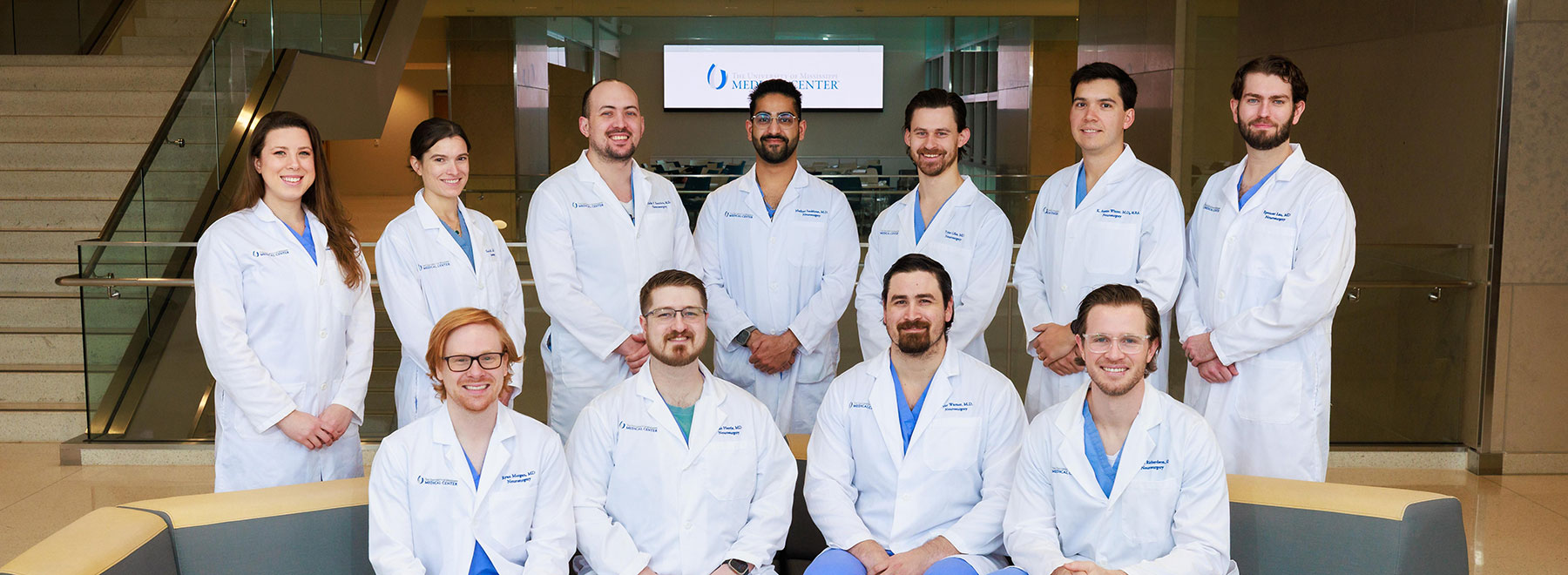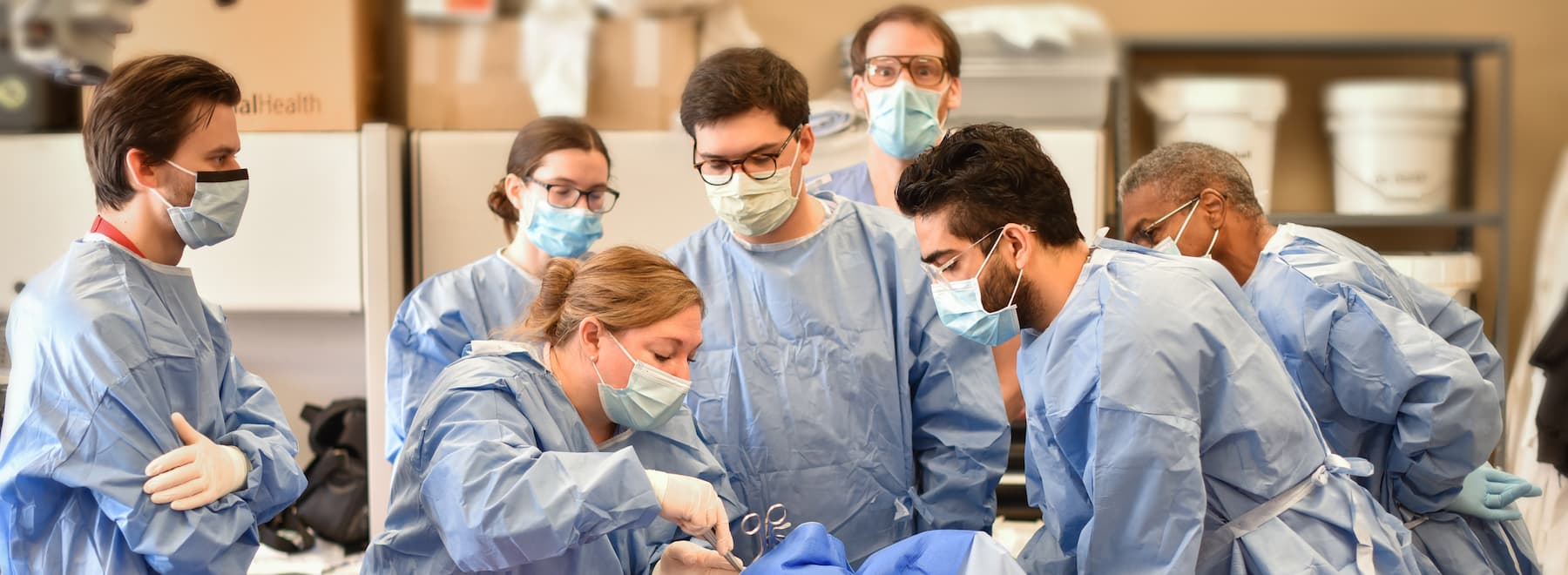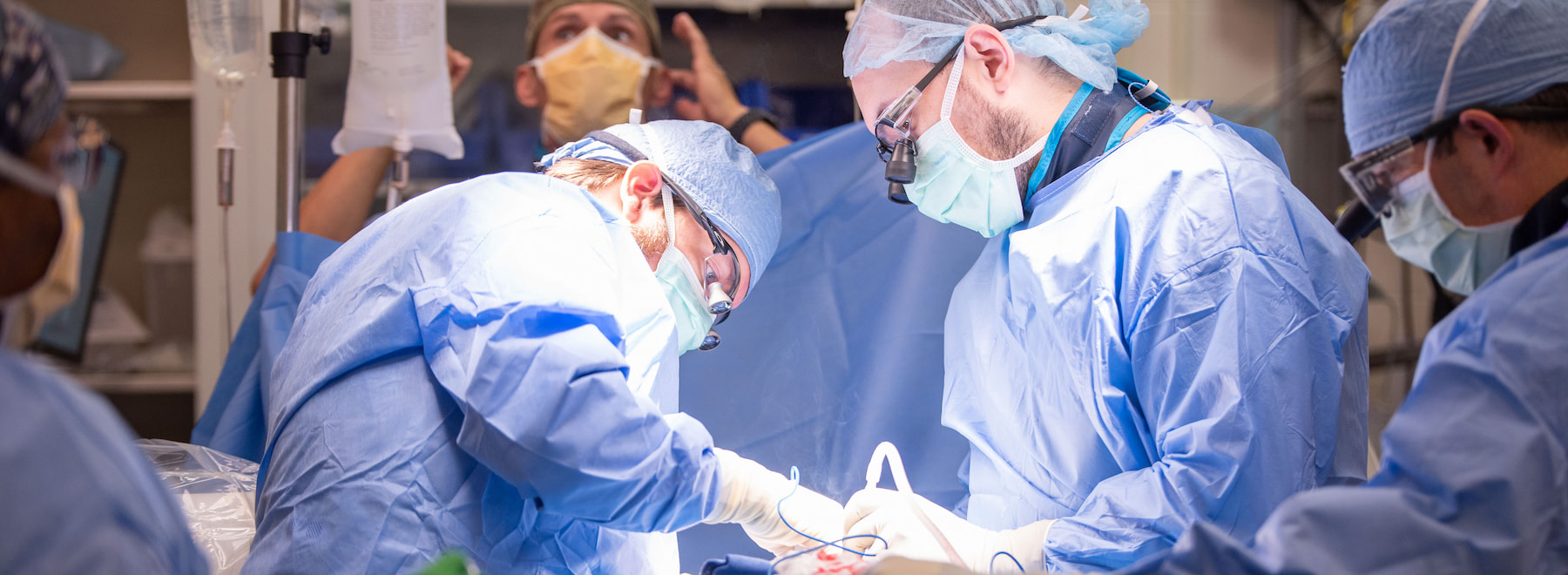


Residency Program
- Department of Neurosurgery
- Contact Neurosurgery
-
News
- Department of Neurosurgery News
- 2025
- 2024
- 2023
- 2022
-
2021
- Patient Story: Bradley Hamblin - Brain Tumor
- Patient Story: James Irwin - Childhood Cancer
- Patient Story: Judy Herrington - Stroke
- Patient Story: Kathleen Keeton - Spine
- Patient Story: Lee Roy Nail - Trigeminal Neuralgia
- Patient Story: Patrick Kerns - Aneurysm
- Patient Story: Paul Miller - Pituitary Tumor
- Patient Story: Tamika Larkin-Stowers - Epilepsy
- A Year Later
- New Technology for Minimally Invasive Procedures
- Minimally invasive procedure repairs brain aneurysms at high risk of bursting
- Patient Stories
- About the Department
- Education
- Research
- Support the Department of Neurosurgery
Neurosurgery Residency Program
The Department of Neurosurgery at the University of Mississippi Medical Center is committed to training the next generation of leaders to advance the field of neurosurgery. We offer a fully ACGME accredited, seven-year training program that prepares residents for rewarding careers in both academic and private practice. For over 60 years we've provided a solid foundation for resident education, ensuring comprehensive exposure to a full range of neurosurgical cases. Residents are immersed in every neurosurgery subspecialty including cerebrovascular, endovascular, skull base, neuro-oncology, functional, neurotrauma, neurocritical care, spine, and pediatric. The goal of our residency program is to produce competent, highly skilled surgeons who are able to practice independently and thrive in any patient population.
Program Overview
PGY 1 / Intern
For neurosurgery residents entering at the intern level, we offer a neurosurgical internship that meets the ACGME requirements of acquisition of fundamental clinical skills, including at least 4 months of surgical disciplines other than neurological surgery. Specific rotations vary from year to year based on the intern's needs and the quality of available rotations. Surgical rotations typically include ENT, Trauma, and Plastic Surgery. Non-surgical rotations include Neurocritical Care, Neurology, Anesthesiology, Neuroradiology, and Endocrinology. The intern will spend two months on the neurosurgical service.
PGY 2 / PGY 3
The resident at these levels spends 24 months of clinical neurosurgery on the cranial, spine/trauma, and/or pediatric neurosurgery service depending on the rotation schedule which are in four (6) month blocks. The resident works under the supervision of the chief resident and faculty at University Hospital.
During these years he/she is responsible for the work-up of all patients on the assigned service including most adult neurosurgery patients. He/she is involved in establishing diagnosis and treatment plans as well as performing diagnostic studies such as myelograms and lumbar punctures. He/she performs minor surgical procedures such as peripheral nerve decompressions, burr holes, ventricular punctures, and simple biopsies. The resident is actively involved in intensive neurosurgical critical care, monitoring techniques, and post-operative patient management under the supervision of the chief resident. He/she is involved in conference presentations and student teaching.
During the pediatric rotation, the junior resident works under the supervision of the attending staff responsible for the pediatric neurosurgical patients. He/she is involved in the admission and work-up of all pediatric patients. He/she assists and performs surgical procedures in the operating room to the level of his/her abilities. This resident is responsible for the pediatric neurosurgical clinics, including; craniofacial, brain tumor, and spina bifida clinics.
His/her responsibilities and expectations become somewhat more advanced as he/she develops basic competency in the care of both adult and pediatric patients. The PGY 3 junior resident will spend more time in the operating room on each service.
PGY 4
It is a specific requirement by the end of the PGY 4 year, that the resident is able to recognize, manage and resolve absolute neurosurgical emergencies, such as epidural/subdural hematomas, ICH, acute hydrocephalus, or perform spinal decompression for cauda equina, all with minimal supervision.
Faculty will work with each resident to ensure that they gain the necessary expertise to recognize these entities, evaluate them properly, and be able to think critically until final decisions are attained. Faculty work one on one with the resident in the OR as he/she advances their surgical skills.
PGY 5
This year is heavily devoted to scientific development, by participating in research activities, generally along with existing lines of research developed within the institution. Individuals with specific interests will be supported to initiate and develop their own lines of research.
During this year we encourage travel and attendance to educational courses i.e.: spine, skull base, endoscopy, career development, etc.
The resident at this level should demonstrate that he/she can independently generate scientific literature. It is important for the young physician-scientist to appreciate the value of scientific data, the efforts necessary to conduct studies and to be able to adequately scrutinize and evaluate scientific literature. Not uncommonly residents by this year would have had already attained these objectives, so accommodations can be made for other educational experiences.
PGY 6 / PGY 7 / Chief Resident
The resident at these levels will rotate for 24 months, as chief / senior resident on cranial and spine service. The PGY 6 resident assumes all chief resident responsibilities as the administrative resident of the entire pediatric or adult program. This resident's responsibilities include organizing and scheduling of teaching conferences, teaching residents and medical students and scheduling presentations of patients to attendings and consultants.
Educational programs such as journal clubs and M&M conferences are the responsibility of the chief resident.
At this level of training, the resident is expected to perform complex procedures in virtually all fields of neurosurgery, from clipping aneurysms, to open and endoscopic skull base surgery as well as complex spine reconstructions cases.
At this level, the resident will enjoy a great degree of autonomy according to his/her abilities.
During this time, there is the opportunity for the resident with the right abilities and a strong interest, to pursue advanced training in a specific field or subspecialty, as a formal fellow, i.e.: Endovascular Neurosurgery, Neuro Critical Care, and Endoscopic Endonasal Cranial Base Surgery.


